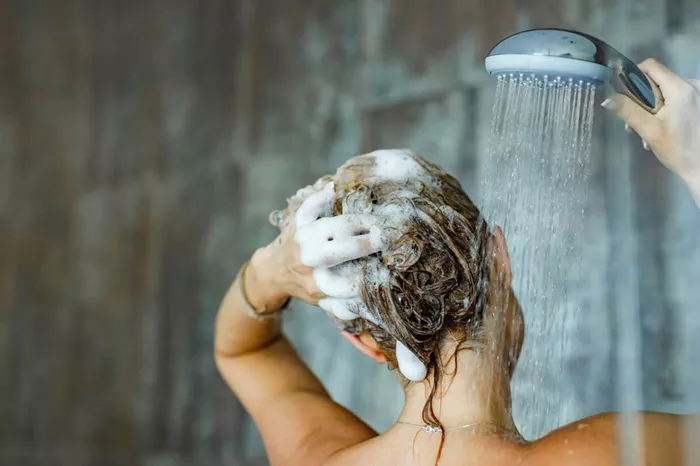Hair health is crucial. It impacts your appearance. Many people wonder, does washing your hair every day damage it? To answer this, we need to explore hair biology, types, and care practices.
Hair Structure and Biology
Hair Shaft and Follicle
The hair shaft is what you see. The follicle is the root beneath the scalp. Each part has a role in hair health.
Natural Oils
Your scalp produces sebum. Sebum moisturizes and protects hair. Daily washing can strip these oils away.
Hair Types and Their Needs
Straight Hair
Straight hair tends to get oily. Sebum travels easily from the scalp down the hair shaft.
Wavy Hair
Wavy hair has a balance of oiliness and dryness. It needs careful moisture management.
Curly Hair
Curly hair is prone to dryness. Sebum struggles to travel down the curls.
Coily Hair
Coily hair is the driest. It needs lots of moisture. Daily washing can be particularly harsh.
The Effects of Daily Washing
Stripping Natural Oils
Sebum is essential. Washing every day removes it. This leads to dry, brittle hair.
Scalp Health
A healthy scalp is vital. Over-washing can lead to irritation. It disrupts the natural balance.
Hair Damage
Dryness and Breakage
Without natural oils, hair becomes dry. Dry hair is prone to breakage.
Split Ends
Dry, brittle hair leads to split ends. Regular trims are necessary to manage this.
Frizz
Lack of moisture causes frizz. Frizzy hair looks unhealthy and is hard to manage.
Myths About Daily Washing
Clean Hair Equals Healthy Hair
Clean hair is good, but too clean can be bad. Natural oils are essential for hair health.
Greasy Hair Needs Daily Washing
Greasy hair can be a result of over-washing. Your scalp produces more oil to compensate.
Benefits of Less Frequent Washing
Retained Moisture
Less washing means more natural oils. This keeps hair hydrated and healthy.
Improved Scalp Health
A balanced scalp produces the right amount of oil. It stays healthy without irritation.
Stronger Hair
Moisturized hair is stronger. It’s less prone to breakage and split ends.
Alternatives to Daily Washing
Dry Shampoo
Dry shampoo absorbs excess oil. It’s a good alternative to daily washing.
Co-Washing
Co-washing means washing with conditioner only. It cleanses without stripping oils.
Gentle Shampoo
Use a gentle, sulfate-free shampoo. It cleans without removing too much oil.
Creating a Hair Washing Schedule
Hair Type Consideration
Straight Hair
Straight hair may need washing every other day. Use dry shampoo in between.
Wavy Hair
Wavy hair can be washed every two to three days. Co-washing can help maintain moisture.
Curly Hair
Curly hair may need washing once a week. Co-washing is beneficial here too.
Coily Hair
Coily hair benefits from washing every one to two weeks. Focus on moisture retention.
SEE ALSO: How to Wash Hair Extensions?
Lifestyle and Environment
Active Lifestyle
If you sweat a lot, rinse your hair with water. Use a gentle shampoo as needed.
Environmental Factors
Pollution and humidity affect hair. Adjust your washing schedule accordingly.
Proper Washing Techniques
Pre-Wash Routine
Detangle your hair before washing. This reduces breakage.
Shampoo Application
Focus shampoo on the scalp. Massage gently to clean without damaging.
Conditioner Use
Apply conditioner to the ends of your hair. Avoid the scalp to prevent greasiness.
Post-Wash Care
Drying Your Hair
Pat hair dry with a towel. Avoid rubbing to reduce frizz and breakage.
Leave-In Conditioners
Use leave-in conditioners for extra moisture. They protect hair throughout the day.
Styling Products
Choose products that suit your hair type. Avoid those with harsh chemicals.
Conclusion
Washing your hair every day can damage it. It strips natural oils, leading to dryness and breakage. Consider your hair type and lifestyle. Adjust your washing schedule to maintain healthy, beautiful hair. Use alternatives like dry shampoo and co-washing. Follow proper washing techniques and post-wash care. Your hair will thank you for it.
FAQs
What happens if you wash your hair every day?
Washing your hair every day can have several effects:
Stripping Natural Oils: Daily washing removes the natural oils (sebum) that moisturize and protect your hair. This can lead to dryness and dullness.
Dry and Brittle Hair: Without enough natural oils, hair can become dry and more prone to breakage.
Scalp Issues: Over-washing can irritate the scalp, causing itchiness, flakiness, and even exacerbating conditions like dandruff.
Color Fading: For those who dye their hair, frequent washing can cause color to fade more quickly.
How can I wash my hair every day without damaging it?
To wash your hair daily without causing damage, follow these tips:
Use a Gentle Shampoo: Choose a sulfate-free shampoo that’s gentle on your hair and scalp.
Focus on the Scalp: Apply shampoo primarily to the scalp and roots, where oil buildup occurs. Massage gently to cleanse without stripping too much oil.
Condition Properly: Apply conditioner mainly to the ends of your hair. This keeps them moisturized without making your scalp oily.
Avoid Hot Water: Wash your hair with lukewarm or cool water. Hot water can strip away natural oils.
Limit Styling Products: Use styling products sparingly, especially those with alcohol or harsh chemicals that can dry out your hair.
Consider Alternatives: On days when you don’t shampoo, use dry shampoo to absorb excess oil and refresh your hair.
Will my hair be healthier if I stop washing it every day?
Stopping daily washing can lead to healthier hair for many people:
Preserves Natural Oils: Less frequent washing allows your scalp’s natural oils to nourish your hair, keeping it moisturized and resilient.
Reduces Dryness and Breakage: Hair that retains more natural oils tends to be stronger and less prone to split ends and breakage.
Balanced Scalp: Giving your scalp a break from daily washing can help maintain a balanced pH and reduce scalp irritation.
Enhanced Hair Texture: Hair may appear shinier and feel softer when it retains its natural oils.
Color Retention: If you color your hair, washing less frequently can help preserve the color longer.
You May Be Interested In

